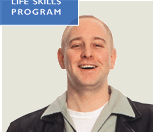
Making Up for Missed Learning about Life Tasks

Substance abuse programs desiring to reduce recidivism and increase the likelihood that a client will become employed, use the Adkins Program to provide the kind of developmental learning that many persons using drugs or alcohol have missed. This kind of positive learning goes beyond jobs and careers to the essential psychological skills and values of self-direction and self-development that were delayed or impaired during the years of substance abuse.
The Adkins Program is the ideal complement to traditional treatment methods that focus on the elimination of negative, self-defeating behaviors.
The program enhances the true rehabilitation of the chemical abuser by focusing on the acquisition of essential coping skills, based on new concepts, new knowledge, different values, and new behaviors which have not yet become part of the individual's repertoire.
Stressing the Positive

The Adkins Program requires that the participants become actively involved in conducting inquiries, gaining new experiences, internalizing new learning and practicing new behaviors until they can competently perform the new coping skills.
It is our conviction that the learning of necessary new values, attitudes, strategies, and the making of life-affirming choices requires a different kind of learning process, one that stresses the positive. The process must help the individuals think differently, help them decode emotion, learn new concepts and practice new behaviors to mastery. What the program does is help a person substitute new effective life-sustaining attitudes and behaviors for old ineffective life-draining attitudes and behaviors. The Adkins Program helps substance abuse agencies provide this kind of positive, new learning to their clients.
Designed by Psychologists

The Adkins Program was designed by psychologists and counselors based on proven learning principles and methods to provide a means for helping under-developed persons learn the essential concepts, knowledge, values, strategies and life-affirming choices essential for personal and career development.
To do so, it uses a unique structured group learning method in which people are made to feel safe, where they will not be attacked, where their naive ideas, dreams, buried aspirations can surface, be discussed, developed or discarded. The learning process is structured to help clients realize how much they have already learned about themselves and the world. It also provides the opportunity through hundreds of carefully developed learning activities, to acquire the knowledge they need to learn to choose and prepare for a career and to get, find and hold satisfying jobs.

Supporting Research
The Hope Program is one of the oldest and most effective agencies working with homeless men and women in Brooklyn, NY. As it is well known, homeless persons often exhibit a range of other problems including illiteracy, malnutrition, emotional difficulties, drug abuse, and a number of problems with the criminal justice system.
Hope has thus had to cope with the problems of substance abuse. In one study at Hope it was found that 86% of the clients had histories of substance abuse and over one quarter of them were actually living in drug treatment facilities. These figures are not unlike those for an agency which has substance abuse as its major treatment focus and the ratio of in-patient and out-patient is similar.
Nonetheless, despite these barriers to employment, the Hope Program employability program which uses the Adkins as well as mental health, literacy, computer training and internship components, has been very successful in helping its clients become economically self-sufficient. In one study 124 people graduated. Ethnically 95 were African American, 21 Hispanic and 11 Caucasian. 75% became employed and 25% in addition went on for further education. 89% of those without children living at home retained their jobs for over 90 days. There was a 75% retention rate for those with children living at home.
The Hope Program: Client Profile and Outcomes
[ MORE RESEARCH ] [ TOP ]
Call to find out how the Adkins Program can add a new element to your treatment program.
1-203-561-6599
|


